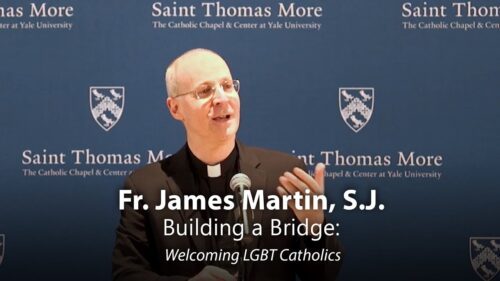I was sitting in the booth of a sports bar with an older relative, waiting for our salads to arrive as they explained why they would not be attending my wedding. When they cited natural law as one objection, I responded by saying that it was rooted in Greek philosophy and adopted by the Catholic Church far into its history. “At least I think so,” I said.
“I don’t know about that,” they said, sipping a glass of wine.
I had been out for years by the time that my wedding invitations were sent. While most people in my big, traditional Catholic family handled my coming out with love and respect, I knew that beneath it all, we had theological and ethical differences. I thought that having a small destination wedding might help me to avoid confronting the unspoken. But I married an Indian man, and he doesn’t know what a small wedding is.
Here was a chance for my nearest and dearest to say “yes” or “no” to my relationship, and some said “no.”
So we planned a proper wedding. Here was a chance for my nearest and dearest to say “yes” or “no” to my relationship, and some said “no.”
I’d been waiting for this moment. It was tempting to fall into an old pattern of binary thinking in which I break the world into the goodies and the baddies. In this case, this would mean that I was a progressive, open-hearted Christian and my relative was a legalistic “trad.” The judgmental framework felt familiar and I recoiled.
I’d had the arguments in my head a thousand times, practiced letting them go and landed on feeling that if I was secure in my position both spiritually and intellectually, the opinions of others need not matter. So I decided to limit the amount that I engaged the topic with family members.
Initially, I stuck to my boundaries. I was a 37-year-old and I had yet to see a person change their mind as the result of political or theological debate. There was no single argument that could replace 20 years of discernment, prayer and reading. If hearts and minds were to change, I would have to trust in forces larger than myself to do the heavy lifting.
Then, something surprised me. I chose to cross a boundary and talk it out with a relative I respect. “Alright,” I said. “Let’s talk about this [wedding] invitation.”
It was clear that they had agonized over the decision. “I just can’t,” they told me. I told them that I expected this and understood that they had put thought and prayer into the choice. “I knew that you would,” they said.
My inquiry was not combative, the way it had unfolded in my head. We had wine and we were enjoying one another’s company.
“But I would like to understand why,” I continued. My inquiry was not combative, the way it had unfolded in my head. We had wine and we were enjoying one another’s company. I was actually curious.
Then came the usual topics: natural law, tradition, church teaching. The usual Scripture passages were thrown around. I was surprised that I was able to talk about subjects like Scripture and ethics with a sense of ease and comfort. My relative was also open and agreed to read a book I recommended, “God and the Gay Christian” by Matthew Vines.
Because I had thought about the topic so much, I had a lot to say. I wasn’t defensive, but I learned that I could honor my beliefs in a thoughtful, clear way. Because my discernment wasn’t just intellectual, but also prayerful, I felt it in my heart and my head. Discussing things clarified my own beliefs.
My relative talked about their experience of church. They thought out loud about what people they trusted would have done. They teared up while discussing deceased loved ones.
By the time I came out, I had been thinking about these issues for many years. As I listened to my relative speak, I realized that they had been thinking about them for about 15 minutes. It took me long enough to come to a space of acceptance. I realized that they deserved the same chance to discern with time. This would be a long-term project.
I’m a therapist. I have been using the word “boundaries” every day since I got my degree. Lately, I’ve noticed that the word is having a moment. Studies have shown that more people than ever are cutting themselves off from their families. Many have good reasons.
Because my discernment wasn’t just intellectual, but also prayerful, I felt it in my heart and my head. Discussing things clarified my own beliefs.
My dinner with a family elder on an otherwise boring Wednesday evening taught me the value of pushing boundaries when the time is right. If I hadn’t, I might have stayed stuck in a private argument I was having mostly in my head and I never would have discovered the love and healing that’s possible on the other side. After the conversation, I still disagreed with my elder. But because I understood their experience, I felt closer to them.
As a gay man in the church, I’ve spent so much time worrying about inclusion that I often need to remind myself that this means being in community with people who disagree with my understanding of sexual ethics. Often, the way things are understood today, disagreement is equated with a rejection of self. I don’t think it’s a real community if it doesn’t include some people who think differently than you.
Two days after the big dinner with my relative, I received a phone call. “I’m three pages in,” they said of the book. “And I just want to say that I’m sorry.”
I couldn’t speak.
“I’m just thinking about what you must have gone through. And I’m so sorry if I contributed to any of it.”
I wanted to tell them I understood. I couldn’t find the words.
“You don’t have to say anything,” they said. “I’m sorry, and I love you.” And they hung up.
After the conversation, I still disagreed with my elder. But because I understood their experience, I felt closer to them.
I’m obedient by nature. I used to fantasize about coming out in some ideal future where my relationship is simply about who I eat dinner with every night and is not inherently a statement of where I stand on a moral issue.
But it’s impossible to extract my experience as a gay Catholic from a church swept up in the American culture wars. That would be like trying to remove the sugar from a baked cake.
Maybe it’s all part of some larger story. Learning to love those who I disagree with certainly feels like an invitation that’s bigger than who attends my wedding. Jesus could certainly be accused of lacking boundaries in this regard. The religious leaders of his time thought so when he ate with tax collectors and sinners.
At the edge of safe and unsafe, agreeing and disagreeing, I wonder what the Holy Spirit is up to.



